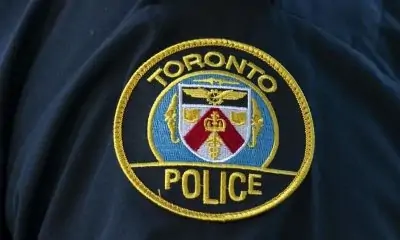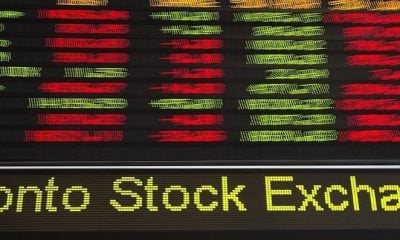As Canada enters a new decade, a look back at the political scene when the last one started reveals how much has changed.
Politics
A decade ago in Canadian politics: Duceppe, Layton, Ignatieff and Harper – Montreal Gazette

Christmas card family photo of Justin Trudeau with his wife Sophie Gregoire (L), and children Alex and Ella-Grace.
The Conservatives had a minority government. The New Democrats were surging as the Bloc Québécois sank. And the Liberals were floundering.
What a difference 10 years can make.
As Canada enters a new decade, a look back at the political scene when the last one started reveals how much has changed — and how the same themes keep resurfacing, from Justin Trudeau’s attire to Western separatism to Quebec-Alberta spats.
Liberals
Michael Ignatieff was Liberal leader at the beginning of the decade. Never able to shake his stuffy-intellectual persona, he would go down as a footnote — the leader under whom the Liberals fell to third place in the House of Commons for the first time.
His visit to Montreal in the summer of 2010 was telling. Ignatieff, leader of the opposition and on a bus tour of Canada, was supposed to be the centre of attention at a Jarry St. restaurant. But a dashing rookie MP with star power and a bankable name (in some parts of Canada, at least) stole the show.
Ignatieff, who at 63 had spent much of his life as a deep-thinking academic, looked uncomfortable as he glad-handed in shirt sleeves. Meanwhile Justin Trudeau, 38 and elected less than two years earlier, exuded confidence, working the room like a natural. Most cameras were focused on Trudeau, not his boss.
Many had predicted a future in politics 10 years earlier when Trudeau, a drama teacher at the time, gave a moving eulogy at the funeral of his father, former prime minister Pierre Trudeau.
In 2010, it wasn’t all Trudeaumania.
The Montreal MP ended the year in controversy — and, foreshadowing some of his future imbroglios, it involved a fashion choice.
Christmas card family photo of Justin Trudeau with his wife Sophie Gregoire (L), and children Alex and Ella-Grace. Jean-Marc Carisse /
jpg
The Liberal MP’s family Christmas card featured him, his wife, Sophie Grégoire, and their children huddling under a fur blanket and wearing Canada Goose parkas with coyote-fur-trimmed hoods. Furious animal rights activists denounced the card as “a lurid way of celebrating peace on Earth.”
Ignatieff quit after his ignominious defeat in 2011 and Trudeau easily won the race to replace him two years later. In 2015, Trudeau went on to surprise many by winning a comfortable majority government, thanks in part to strong support in Quebec.
But four years in office took a toll. After a series of scandals and missteps — from SNC-Lavalin to his outfits on a trip to India to old blackface photos — Trudeau was reduced to a minority in the October 2019 election. Alberta and Saskatchewan were particularly harsh, electing not a single Liberal MP.
Conservatives
In 2010, Conservative Stephen Harper, first elected prime minister in 2006, was in his second consecutive minority government; he would go on to finally win a majority a year later.
Harper’s rise to power on a wave of support from the West had helped quell discontent in that part of the country.
A 2005 poll for the Western Standard magazine had found 42 per cent of Albertans, frustrated by policies of Liberal prime ministers Jean Chrétien and Paul Martin, thought they should “begin to explore the idea of forming their own country.”
Fast forward to today. Another Liberal government is in power and Western Canada is again disgruntled. An Angus Reid survey this year found 52 per cent of Albertans think the West would be better off if it left Canada
In 2010, few outside Saskatchewan had heard of an obscure MP named Andrew Scheer, today the outgoing Conservative leader after fumbling his way through October’s election. Back then he was deputy speaker of the House of Commons.
Ten years ago, some top contenders to replace Scheer were high profile members of Harper’s cabinet. Another was premier of Quebec.
Rona Ambrose was Harper’s public works minister in 2010 and Peter Mackay was minister of national defence.
Ten years ago, possible Conservative leadership candidate Jean Charest was the Liberal premier of Quebec. At the time, he was resisting calls for a public inquiry into corruption in government contracts and criminal control of the construction industry.
Conservative Prime Minister Stephen Harper and Liberal Quebec Premier Jean Charest hold a photo op near Chelsea, Que., in 2009. Ten years later, Charest is reportedly considering running for the leadership of the Conservative Party.THE OTTAWA CITIZEN
Bloc Québécois
The Bloc Québécois, under leader Gilles Duceppe, was riding high in 2010. Two years earlier, it had won 38 per cent of the vote in Quebec and 49 of the 75 federal seats in province. Few would have predicted the sovereignist party would be all but wiped out by the NDP the following year.
In 2010, Duceppe wanted to get the lay of the land he sought to break up. He went on a cross-Canada talking tour, including a stop in Alberta where his call for an end to the billions in tax breaks for the oil industry led to predictable outrage.
He told an Edmonton press conference that Albertans had a lot in common with their compatriots in Quebec: ”I understand they can be fed up with the kind of attitude in Ottawa, always ‘Ottawa knows best’.”
Many Albertans were ready to say good riddance to Duceppe and his province. Just over one-quarter of Albertans polled at the time thought Quebec would be better off alone — the highest support for Quebec separation outside that province.
Duceppe would abandon the Bloc leadership in 2011 after he lost his own seat and his party suffered a humiliating defeat at the polls. With NDP popularity in overdrive in Quebec, the Bloc had won just four seats, 45 fewer than in the last election.
Bloc Québécois Leader Gilles Duceppe waves from his car after announcing that he is stepping down as leader after the party’s humiliating loss in 2011.Dario Ayala /
The Gazette
The party would endure years in the wilderness before surging back in 2019 under current leader Yves-François Blanchet. Bolstered by a rise in nationalism and Trudeau’s stance against Quebec’s secularism law, the Bloc more than tripled its number of MPs — to 32 from the 10 elected in 2015.
Like Duceppe before him, Blanchet infuriated the West.
He has called for an end to oil-industry subsidies and a new provincial equalization system that would penalize provinces with emissions higher than a national average.
The return of the Bloc does not indicate Quebec is keen on sovereignty. In 2010, 42 per cent of Quebecers polled wanted to split from Canada. By March 2019, 55 per cent of the province’s population thought sovereignty was “an idea whose time has passed.”
New Democratic Party Leader Jack Layton, with his wife and fellow MP Olivia Chow by his side, announces in 2010 that he has prostate cancer. He died a year later after being diagnosed with a different form of cancer.Aaron Lynett /
NAT PST
New Democratic Party
In 2010, the New Democratic Party was on the cusp of a historic election.
But the year started with news that leader Jack Layton had prostate cancer. He vowed to beat it and continue as leader.
Opposed to most Conservative policies, Layton had nevertheless propped up the minority Harper government in 2009 when the Liberals wanted to force an election.
Two years later, the NDP helped topple Harper. In the ensuing election, Layton surged in popularity, particularly in his home province of Quebec, thanks in part to his stellar performance on Tout le monde en parle, a popular talk show.
Harper won a majority. But the NDP had its best showing ever, winning 103 seats, ahead of the Liberals. The party took 59 out of 75 seats in Quebec, leaving the Bloc in its dust. The NDP, having moved to the centre, was the official opposition for the first time and speculation swirled that Layton would one day be prime minister.
Then, in July, less than three months after the election, Layton announced he was temporarily stepping down as leader to battle a newly diagnosed cancer. He died in August.
Former Quebec Liberal environment minister Thomas Mulcair took over as leader but support for the NDP dropped steadily in the ensuing years.
The Gazette
After Mulcair was pushed out as leader, the party bet on a fresh face in 2017. They elected Jagmeet Singh, a criminal defence lawyer with a penchant for expensive suits.
Back in 2010, Singh was providing legal advice to Sikh activists protesting the visit of an Indian minister to Canada over his alleged involvement in anti-Sikh riots. Singh jumped into politics a year later, winning a seat in the Ontario legislature. In 2017, he took over as NDP leader.
Singh has not managed to revive the party’s fortunes. In the 2019 election, support fell further, particularly in Quebec. The NDP won only 24 seats, 20 fewer than it had under Mulcair. In Quebec, one NDP MP was left standing.
In 2010, Green Party Leader Elizabeth May tapped an unlikely candidate to be her deputy leader: former Montreal Canadiens enforcer Georges Laraque.Colleen De Neve /
Calgary Herald
Green Party
At the beginning of the decade, Elizabeth May was the leader of the Green Party. Twice she had unsuccessfully run for a seat in the House of Commons. May was third-time lucky in 2011, becoming the party’s first MP.
In 2010, after deputy leader Jacques Rivard quit the Greens to join the Bloc as an environmental adviser, May tapped an unlikely replacement.
Taking on the deputy role was Montreal Canadiens enforcer Georges Laraque, whose hockey career had just ended. A political neophyte, Laraque stayed on until 2013 but never ran for the party.
In the October 2019 election, the Greens for the first time garnered more than 1 million votes. And three Green MPs won seats, meaning May would no longer be the party’s sole voice in Parliament.
But after 13 years as the helm, May stepped down as leader in November, saying it was time for a change at the top.
In the provinces
Upheaval over the past decade wasn’t restricted to the federal scene.
Politics in provincial legislatures were also shaken up.
In 2010, Harper started the decade with four Liberal premiers as counterparts, as well as three Progressive Conservatives, two New Democrats and one from the Saskatchewan Party.
Ten years later, Trudeau is dealing with a more fractured provincial landscape.
Premiers in power today represent six parties.
As the decade ends, there are four Progressive Conservative premiers, two Liberals and one New Democrat. The other provincial parties in power: the Coalition Avenir Québec, the Saskatchewan Party and Alberta’s United Conservative Party.

Politics
NDP caving to Poilievre on carbon price, has no idea how to fight climate change: PM

OTTAWA – Prime Minister Justin Trudeau says the NDP is caving to political pressure from Conservative Leader Pierre Poilievre when it comes to their stance on the consumer carbon price.
Trudeau says he believes Jagmeet Singh and the NDP care about the environment, but it’s “increasingly obvious” that they have “no idea” what to do about climate change.
On Thursday, Singh said the NDP is working on a plan that wouldn’t put the burden of fighting climate change on the backs of workers, but wouldn’t say if that plan would include a consumer carbon price.
Singh’s noncommittal position comes as the NDP tries to frame itself as a credible alternative to the Conservatives in the next federal election.
Poilievre responded to that by releasing a video, pointing out that the NDP has voted time and again in favour of the Liberals’ carbon price.
British Columbia Premier David Eby also changed his tune on Thursday, promising that a re-elected NDP government would scrap the long-standing carbon tax and shift the burden to “big polluters,” if the federal government dropped its requirements.
This report by The Canadian Press was first published Sept. 13, 2024.
The Canadian Press. All rights reserved.
Politics
Quebec consumer rights bill to regulate how merchants can ask for tips

Quebec wants to curb excessive tipping.
Simon Jolin-Barrette, minister responsible for consumer protection, has tabled a bill to force merchants to calculate tips based on the price before tax.
That means on a restaurant bill of $100, suggested tips would be calculated based on $100, not on $114.98 after provincial and federal sales taxes are added.
The bill would also increase the rebate offered to consumers when the price of an item at the cash register is higher than the shelf price, to $15 from $10.
And it would force grocery stores offering a discounted price for several items to clearly list the unit price as well.
Businesses would also have to indicate whether taxes will be added to the price of food products.
This report by The Canadian Press was first published Sept. 12, 2024.
The Canadian Press. All rights reserved.
Politics
Youri Chassin quits CAQ to sit as Independent, second member to leave this month

Quebec legislature member Youri Chassin has announced he’s leaving the Coalition Avenir Québec government to sit as an Independent.
He announced the decision shortly after writing an open letter criticizing Premier François Legault’s government for abandoning its principles of smaller government.
In the letter published in Le Journal de Montréal and Le Journal de Québec, Chassin accused the party of falling back on what he called the old formula of throwing money at problems instead of looking to do things differently.
Chassin says public services are more fragile than ever, despite rising spending that pushed the province to a record $11-billion deficit projected in the last budget.
He is the second CAQ member to leave the party in a little more than one week, after economy and energy minister Pierre Fitzgibbon announced Sept. 4 he would leave because he lost motivation to do his job.
Chassin says he has no intention of joining another party and will instead sit as an Independent until the end of his term.
He has represented the Saint-Jérôme riding since the CAQ rose to power in 2018, but has not served in cabinet.
This report by The Canadian Press was first published Sept. 12, 2024.
The Canadian Press. All rights reserved.
-

 Sports18 hours ago
Sports18 hours agoKirk’s walk-off single in 11th inning lifts Blue Jays past Cardinals 4-3
-

 Sports24 hours ago
Sports24 hours agoAnother player from top-ranked Georgia arrested for reckless driving
-

 News24 hours ago
News24 hours agoAustralia’s Michael Matthews earns third win at Quebec cycling GP
-

 Sports18 hours ago
Sports18 hours agoCanada’s Marina Stakusic falls in Guadalajara Open quarterfinals
-

 News23 hours ago
News23 hours agoKamloops, B.C., man charged with murder in the death of his mother: RCMP
-

 Sports24 hours ago
Sports24 hours agoWhitecaps loan Herdman to CPL’s Cavalry, sign two reserve players to first-team deals
-

 Sports18 hours ago
Sports18 hours agoStampeders return to Maier at QB eyeing chance to get on track against Alouettes
-

 News23 hours ago
News23 hours agoS&P/TSX gains almost 100 points, U.S. markets also higher ahead of rate decision






























